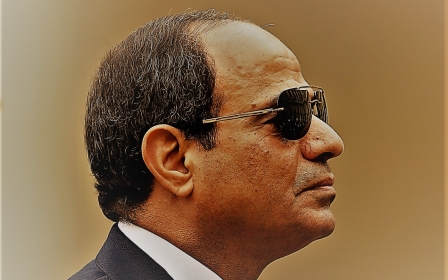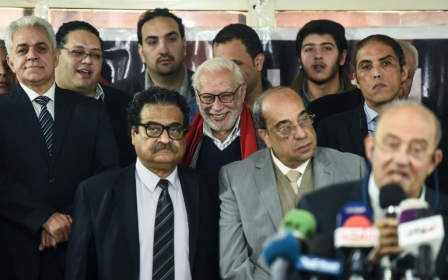Families of political prisoners in Egypt barred from visiting relatives

Families of many political prisoners in Egypt have complained that they have recently been barred from visiting their detained relatives despite obtaining permits from the interior ministry.
At least 13 families were barred from visits, according to numerous reports by local activists, including the family of former presidential candidate Abdelmonem Abolfotouh and those of prominent politicians Massoum Marzouk and Shadi al-Ghazali Harb, as well as the son of former president Mohamed Morsi.
The restrictions on visiting prisoners violate Egypt’s own prison law that grant prisoners the right to two visits per month.
The issue of the visit bans was brought to the fore after the family of detained socialist activist Alaa Abdelfattah staged a sit-in in front of Tora prison and tweeted about their ordeal as they waited for six days until the prison authorities allowed them to visit Abdelfattah, despite having a permit to visit him since Tuesday.
New MEE newsletter: Jerusalem Dispatch
Sign up to get the latest insights and analysis on Israel-Palestine, alongside Turkey Unpacked and other MEE newsletters
Abdelfattah is currently held at the Tora Agriculture Ward prison and has only 34 days left before his five-year prison sentence is served. He was arrested in November 2013 on charges of violating the protest law and insulting the judiciary.
According to Mona Seif, Abdelfattah’s sister, his family had obtained a permit from the prosecutor general, but prison authorities “did not implement the law” and had “waited for orders from the National Security services” to allow for the visit.
On Sunday, the family was finally allowed to see Abdelfattah, but from behind a glass panel, according to his aunt, Ahdaf Suweif.
“The visit was in a small room divided by a glass panel. They had to speak to Alaa through handsets from behind the glass. Several security personnel were present on both sides of the glass throughout the visit,” Suweif, a novelist, said in a Facebook post.
Suweif also added that security personnel did not deliver food, clothes and medicine, which the family was told would be delivered during the visit.
Maisara Marzouk, daughter of left-wing leader and former ambassador Massoum Marzouk, said she and her family were denied a visit to her father on Saturday. She accused the security services of “slowly murdering” her 73-year-old father as he continues to be held in solitary confinement despite concerns over his health.
“Today, I was supposed to see you baba, but I was denied my right of visit, as I was denied many other rights, about which I can only lament through these words on platforms no one would bother to read, and pray, desperately, for a voice of truth,” Maisara Marzouk wrote on Facebook.
Massoum Marzouk was arrested in August 2018 after calling for a snap referendum on Sisi, and was charged with aiding a terrorist group to achieve its goals, receiving funding with terrorist intent, and participating in a criminal agreement with the purpose of committing a terrorist crime.
Families of Marzouk’s co-defendants, including university professor Yehia al-Qazzaz and Socialist Popular Alliance Party leader Raed Salama, have also been barred from visits last week, according to lawyer Khalid Ali.
Meanwhile, the son of former president Morsi said on Sunday his family has not been able to visit his detained brother, lawyer Osama Morsi, for over 17 months.
Morsi’s family visited him only three times since the coup that ousted him in July 2013, according to his family. A panel of British MPs and international lawyers warned in a report last March that Morsi may “die prematurely” because of medical negligence and the circumstances of his solitary confinement.
Mohamed El-Baradei, who served briefly as vice-president after Morsi’s ouster, condemned the restrictions on prison visits as “horrific and contrary to all values” and retweeted a post criticising the restrictions on Morsi’s family, in a rare show of solidarity with the detained ex-president.
Rights groups estimate at least 60,000 political prisoners in Egyptian jails since Abdelfattah el-Sisi became president in 2014, one year after he ousted his predecessor Morsi in a military coup.
Sisi won a second term in April last year, running virtually unchallenged in presidential elections after all candidates - except one, who publicly supported him - were arrested or discredited.
The Egyptian parliament has recently proposed a set of constitutional amendments that would allow Sisi to stay president until 2034 despite the end of his two terms in 2022. The amendments are set to be voted on in a popular referendum later this year.
Middle East Eye delivers independent and unrivalled coverage and analysis of the Middle East, North Africa and beyond. To learn more about republishing this content and the associated fees, please fill out this form. More about MEE can be found here.




